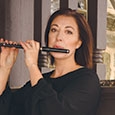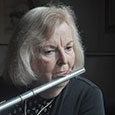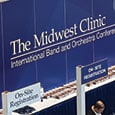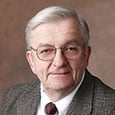As piccoloist of the Philadelphia Orchestra, Erica Peel enjoys an exciting career as an orchestral player, chamber musician, soloist, composer and teacher. She has held positions with the San Diego Symphony, Omaha Symphony, Des Moines Symphony and Honolulu Symphony.
.jpg)
How did you prepare for your first week with the Philadelphia Orchestra as piccolo soloist when you performed the extremely challenging solo in Tchaikovsky’s Symphony No. 4?
Luckily, it was not my first time performing this piece with an orchestra, so I had some experience from which to draw. The challenge for me, as it is with most difficult passages, was to remain confident and consistent. I have found that preparing this excerpt for auditions – where you need to find methods of consistency under pressure and only have one shot to get it right – has been incredibly beneficial. I can’t say that this true of other excerpts, where more flexibility and reactionary musicianship are needed when playing in orchestra. The Tchaikovsky 4 excerpt feels about the same in either context. So in practice, I pick up my piccolo completely cold – after doing laundry or the dishes or catching up on emails – and by way of trial and error, I determine what brings the most consistency. This time (as it changes each time I approach it.), more chin pressure and a faster air speed was what worked. No matter how often I perform it, however, that “5 seconds of terror” feeling remains! In the moment, it is about moving beyond that fear. I believe it was Will Smith who said (via a story about skydiving), “The best things in life are on the other side of maximum fear.” It is why I love being a piccolo player – the blissful sensation that comes after you face and conquer fear is unmatched – and we get to live that over and over again!
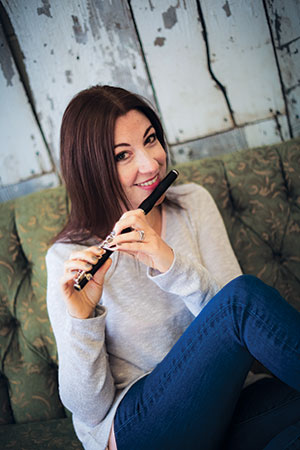
What was the audition process to win your present position?
It was fairly typical for an orchestral position. There was a preliminary round, where all applicants played for about five minutes behind a screen. This round lasted for two or three days, during which the large pool of candidates was narrowed down to about 10-15 for a semi-final round. This round was still screened, and each candidate played for around 20 minutes. The committee then narrowed it down to only three applicants. We each played a final round, which was unscreened and had a concerto (with pianist) and solo (chosen by the candidate) component. After the final round, two of us were chosen to do two trial weeks where we rehearsed and performed with the orchestra on their subscription programs. This is also pretty common, especially for a solo instrument like the piccolo. They want to hear how you fit in with the sound of the orchestra, feel what the chemistry is like in the section, and see how you respond to the music director. These are all crucial for long term happiness. At the end of my second trial week, I was offered the job.
As far as my personal experience with this audition, I recall feeling more relaxed than usual. I had a job that I adored in San Diego and had low expectations for this particular audition. I mean, it was the Philadelphia Orchestra. I did not think I was worthy, but it was an opportunity that comes around once a lifetime, so you take it no matter what. The farther I advanced, the more shocked I was. I did not feel like I nailed it in any of the rounds, but I tried to focus on relishing each moment I was given in that beautiful hall.
During the trial weeks, I felt much more pressure as I was hyper aware that people were judging me – not maliciously, of course – but it was what they were supposed to do. That being said, the musicians were very warm and welcoming, which was a relief. Those “pinch me” moments were plentiful, and again, I just tried to soak in the experience, fully expecting that this would be the only chance I ever had to play with the Philadelphia Orchestra. The musicians were magnificent. I had never felt a unity in musicianship like that before. Everyone breathed and moved together and gave 150% every time. I teared up during rehearsals and performances, just overwhelmed with what I was hearing and feeling and grateful to be a part of it, even if just for a couple of weeks.
When they told me that I got the job, I cried. It was a combination of relief, disbelief, and the mere thought that these incredible musicians believed in me. Yannick Nézet-Séguin, the music director and conductor of the Philadelphia Orchestra, shook my hand and said, “Erica, you are a treasure.” I am pretty sure I looked at him through the tears like he was insane. I thought of my 16-year-old self, who never imagined that I would be in this room, in this situation. I was also cognizant that the room was full of men – not one woman – and it dawned on me that I would be the first woman in the flute section in the history of the Philadelphia Orchestra. I think the only word that repeated through my head and out of my mouth, was “WOW.”
The best advice I can give to people going through the audition process is to detach your self-worth from the outcome. There is a fine line between being constructively critical of ourselves (which is crucial for success) and beating ourselves down for an audition gone wrong (or many gone wrong). If that line gets blurred, we begin to lose faith in our individual musicianship, and our artistic light fades. The reality is that auditions are brutal yet necessary to do what we love. If we can reframe it as a tool for growth, a new challenge from which we learn each time, I think we get closer to success. I am not one of those people who won a job on my first, second or even 20th time. I have lost about five times as many auditions as I have won. For me, the intentional growth after each loss was far more important than after any win.
I also think that diversifying as a person and a musician – not putting all of your eggs into one basket – is paramount to finding fulfillment. I accepted early in my career that I might never win the elusive big job. I fostered other areas of life and explored other avenues of music-making. Even though I may have still wanted that big job, I knew that it was not a requirement for a meaningful existence.
What do you suggest for audition prepration?
I have a “to-each-their-own” perspective on auditions. Learning what works for you will allow you to develop a personal approach that suits you. However, I do strongly feel that auditions are a skill set completely separate from actual orchestral playing. It is a skill set that takes its own attention and practice, and establishing consistency is what I believe is the key to successful auditioning.
After having my daughter, I was forced to re-vamp the way I prepared for auditions. I had far less time (like, barely any at all), and needed to figure out how to accomplish goals within those time limits. As a solution-oriented person, I created an audition methodology through trial and error. This program of smart work felt like the miracle that never failed me. There are many smaller details, but this is the outline.
• As soon as I decide to take an audition, and get the repertoire list, I construct a very detailed schedule of practice, starting from the week of the audition and working backwards. I schedule one run-through of the list every day the week before the audition (just a run-through, no extra practice), with a couple of those being mock auditions for colleagues or friends.
• The week before that, I schedule groups of excerpt work – maybe three or four excerpts a day where I do “touch-up” practice, which should be minimal, focusing on starts and stops of excerpts and mantras (which I will explain later).
• During the weeks before that, every excerpt gets its own day. Making the time for this is imperative, as it gives me assurance that I am being thorough, and panicking a couple of weeks before the audition because I have neglected one or two excerpts becomes a non-issue. I break down each excerpt, no matter how well I think I know it or how well I think I can play it, and force myself to learn it again. This means making sure my intonation is spot on, rhythm is accurate, technique is solid, and musical choices are secured. I record everything and work very hard to avoid playing and listening at the same time. When I record, I put all of my focus into the performance of that excerpt. When I listen, I put all of my focus into critiquing the player I am hearing and problem solving.
• After I dissect the excerpts in this way, I start to write mantras above each excerpt. These can change over the course of preparation, but should be designed to get the best result consistently. My mantras range from being quite technical and physical, like “move air,” “slow fingers,” “support from the ground,” to more abstract, like “fluid, long lines” or “aggressive!” I usually pick two or three mantras on which to focus all of my attention before beginning the excerpt, almost like a meditation. If my mind wanders during the excerpt, as everyone’s does, I can come back to these and refocus. This discipline, in particular, has changed my mindset and ability to concentrate during auditions. Keep in mind, I have to actually practice focusing on the mantras. If you are aiming for consistency, then you have to practice consistency.
Was piccolo always your first love?
The piccolo and I have had an interesting relationship. It was definitely not my first love, or any kind of love at all, until later in my career. I considered myself a flutist first and thought the piccolo was an evil instrument that caused me, and the people who listened to me, pain. I distinctly remember one of my early flute teachers, MaryAnn Archer (formerly of the MET Opera Orchestra), advising me that proficiency on the piccolo is often what clinches the job. That did not sink in until much later in life, but I never forgot it!
My first job with the Honolulu Symphony was an assistant principal flute and piccolo position. I ended up playing little piccolo, and when I did, I was terrified. That was a moment of reckoning. Did I really want to play this instrument? Was it really for me, someone who would much rather blend in than stand out? I began carefully listening to great orchestral piccolo players, something I should have done long before, and realized that playing the instrument with fear is just about the worst way to undertake the task. I began to confront my fear and address the piccolo as its own instrument, not just as a more painful extension of the flute.
In the years following, despite being unsure on which orchestral position I should focus, I consistently found more success in piccolo auditions. Time and time again, I was clearly standing out as a piccolo player, but not so much as a flute player. A turning point was my time with the Omaha Symphony. After winning the audition, I found myself among an incredibly supportive group of friends and musicians who (perhaps unknowingly) encouraged me to grow in a safe environment. During my four years with this orchestra, I started to believe that I could be a piccolo player, instead of a flute player who also played the piccolo.
How did you begin playing the flute?
When I was about 9, I was at dinner with some close family friends. Boredom with the adult conversation set in, and I started to blow over the top of a coke bottle. One of the family friends was a flute teacher, and that was where it all began.
You have a six-year-old daughter, does she play an instrument yet?
As a daughter of two musicians, it is clear that Avery is musically inclined and has a knack for performing. It was her choice to start the violin when she was three, but I found that practicing with her was tough. My inner tiger mom came out in ways I did not like. I expected quite a lot from her and ultimately saw that I was sucking the joy out of it, so we decided to stop the violin. Now, she focuses on dance and theatre but has asked to play the cello and drums. I might be the only parent on the planet who would welcome her child playing the drums.
Did you come from a musical family?
My dad is a musician, and although my mom is not, she is an avid music appreciator. My dad played French horn on the original production of Les Misérables and for artists like Frank Sinatra, Barbra Streisand, KC & the Sunshine Band, Chuck Mangione, and Carly Simon. My brother plays French horn for the Broadway show Aladdin, and has done recording and performances with Josh Groban, James Taylor, Sting, and P Diddy. As it turned out, the love of my life is also a musician. He plays oboe and English horn. We met playing in the Honolulu Symphony and ended up in Omaha by way of his winning the second oboe position with the Omaha Symphony. He is also a very soulful singer and a generally brilliant and beautiful musician.
What made you decide to be a musician?
Growing up, I had my sights set on being a dancer on Broadway, but I experienced a knee injury in middle school from running track. After that, the flute became my main creative outlet. I remember my dad warning me that the path of a musician, and especially that of a flutist, would be harrowing beyond my imagination. “Great flute players are a dime a dozen,” he said. I think he just wanted me to join the family tradition and play the French horn. I took that as a challenge and wanted to prove that I could do it. I believed that orchestral positions were the most stable classical career choice, so that was what I endeavored to do.
.jpg)
What do you think about when you change from playing flute to playing piccolo?
For me, switching from flute to piccolo is like being at your parent’s house and then coming back to the home you have created. They are both comfortable but have distinct sensations. I no longer think about what physical changes I am making although I would say that I use a more pressurized support and faster air speed when switching to piccolo. What usually goes through my mind when I switch to flute is, “Oh, thank goodness – now I can relax!” Even though I feel more secure on the piccolo, blending in still provides a sense of comfort.
How has the programming changed during your years of playing in an orchestra?
This is an interesting question, and I think the answer varies from organization to organization. In general, the programming of movie music (playing the score while the film is shown) has become very popular, and I love it. It is not only entertaining; but it exhibits, in an honest way, how music is undeniably a part of our everyday lives. In turn, it provides an opportunity to engage new audiences and draw them into the world of live classical music.
I also see top orchestras pouring more energy into education and community outreach. It is these organizations, that see the value in being an integral part of the community, that I believe will fare better in the long run. Our music education system is severely lacking. If classical music were a part of the daily school curriculum, we would see measurable improvement in students’ academic and social development. If orchestras can roll up their sleeves, be part of the solution, and help to bridge the gap, not only will their organizations benefit, but so will our world.
What kind of music do you listen to?
I listen to rock, electronic, pop, soul, alternative, and classical. That mostly sums up my playlists. My current favorites are Muse, Aviici, Duffy, Bruno Mars & Nicola Benedetti. This casual listening of music definitely influences me in some way, but I listen differently for motivation and growth on my instrument. When I listen to flutists, I prefer hearing those who have a very different tonal landscape. I am looking for new ideas, ways to approach phrases, and colors and shades of sound that I can add to my palatte. Also, as a new member of the Philadelphia Orchestra, I am overwhelmed with inspiration from the musicians surrounding me. There is no shortage of brilliance, so I am soaking it all in.
Do you have any favorite performance moments?
My first trial week with the Philadelphia Orchestra, playing Shostakovich’s Fourth Symphony, was an experience I will never forget. I was absolutely blown away by every aspect of that moment – the mind-boggling display of musicianship from every section, the meticulous and dynamic leadership of Yannick, the fact that I was lucky enough to be a part of it all – it was an emotional juncture.
Another defining moment in my career was performing the Vivaldi Piccolo Concerto with the Omaha Symphony. For this, I had to find a degree of self-confidence that I had not had before. Thankfully, the steadfast support of my colleagues and music director, Thomas Wilkins, allowed me to find the self-assurance I needed. As someone who has grappled with confidence issues, this was a pivotal event. It is quite astonishing what some conviction of self can do.
How do you find balance in your life?
This is absolutely essential for me to function, but finding it is an ever-changing quest. Balance as a 20-year-old looked a lot different than balance does now. I see it as weighing my priorities, in terms of desires and responsibilities. I could not live a life of joy without my family and friends, and I could not live a fulfilling life without active connections to other people. For now, those connections come in the form of making music. I have responsibilities to my family, to my orchestra and ultimately, to my community. If I am not realizing those, then something will feel amiss. So, I keep a close check on the state of my mind and heart and continually work to preserve perspective.
* * *
Peel also has played with the Los Angeles Philharmonic, Chicago Symphony and Houston Symphony. Her primary studies were with Jill Felber, as a participant in her interim program; Christine Nield-Capote, at the University of Miami (BM); and MaryAnn Archer, formerly of the Metropolitan Opera Orchestra. She lives in New Jersey with her husband, oboist Jason Sudduth, and their 6-year-old daughter, Avery.
Playing Tips
What are your favorite warmups for piccolo?
I like Marcel Moyse’s De La Sonorite 4 and Intervals 2 from The 28 Day Warm Up Book by Paul Edmund-Davies. This book is my new flute bible, and I think it works just as well, if not even better (with minor adjustments, e.g. low C & C#), for the piccolo.
Where do you place the cork?
I like the cork to be about 1mm in from the center of the embouchure hole (as seen with a cleaning rod marking). I find that this creates the best intonation throughout the instrument and the best high register response.
Where do you place the piccolo?
I play around with this a bit. When I am playing pianissimo, I like the edge of the piccolo to sit in a similar place on my lip as it does on the flute. I find I have more control over the intonation, response, and clarity of sound that way. However, when I really need to project, I like to place it just a tiny bit higher on my lip. This gives me a more open and direct sound.
Do you mostly double or single tongue?
I really use both equally. I would say my switching point, where I can no longer single tongue effectively, is at quarter note=120 (sixteenth notes). I also change my tonguing based on style. There are times when a single tongue has the right bounce and clarity, while other times, a double tongue works better for lightness. Of course, changing the consonant and/or placement of the tongue offers even more variety. I am all about experimenting and having as many options from which to choose.
How do you see vibrato usage differ from flute to piccolo?
I have become a bit of a stickler (much to the chagrin of my students) about vibrato. My main thought on the subject is consistent with both flute and piccolo. That is, vibrato should be used thoughtfully to color the sound. I believe that flutists and piccoloists should learn to control vibrato so that they can make a conscious decision, based on the music, whether to use very wide, dramatic vibrato, skinny, shimmery vibrato, something in between, or none at all. Vibrato should be used to help to shape phrases and create magical moments. That said, I do find more effort is required to vibrate in the upper register on the piccolo. It is something that I need fairly constant work on to keep in shape.
* * *
The top 10 excerpts every piccolo player should know
Bartók, Concerto for Orchestra, Elegia
Beethoven, Symphony No. 9, 4th mvt
Berlioz, Symphony Fantastique, 5th mvt
Ravel, Piano Concerto in G, 1st mvt opening
Ravel, Ma mère l’oye, Laideronnette
Rimsky-Korsakov, Scheherazade, 4th mvt
Rossini, Overture to Semiramide
Stravinsky, Firebird Suite, Variation de l’oiseau de feu
Shostakovich, Symphony No. 6, 1st mvt solo
Tchaikovsky, Symphony No. 4, Scherzo
